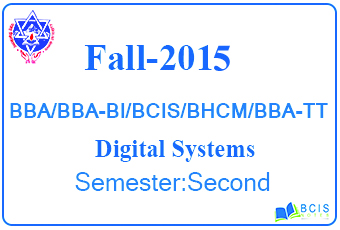
Spring 2015 Digital Systems
This is the question set along with the answers of Spring 2015 Digital Systems which was taken by the Pokhara University (PU).
POKHARA UNIVERSITY(PU)
| Level: Bachelor | Semester – Spring | Year: 2015 |
| Program: BCIS | Full Marks: 100 | |
| Course: Digital Systems | Pass Marks: 45 | |
| Time:3hrs | ||
| Candidates are required to give their answers in their own words as far as practicable. | ||
| The figures in the margin indicate full marks. | ||
Section “A”
Very Short Answer Questions
| SN | Attempt all the questions. | 10×2 |
| 1 | What do you mean by digital system? | 2 |
| 2 | What is bit? | 2 |
| 3 | What is XOR gate? | 2 |
| 4 | What is encoder? | 2 |
| 5 | What is flipflop? | 2 |
| 6 | What do you mean by triggering of flipflop? | 2 |
| 7 | What is memory? | 2 |
| 8 | Explain CMOS. | 2 |
| 9 | What is ALU? | 2 |
| 10 | What is k-map? | 2 |
Section “B”
Descriptive Answer Questions
Attempt any six questions. 6X10
11.Simplify the following expression.
Σm (0, 2, 5, 9, 15) + Σd (1, 4, 7, 12)
Using K-map and draw the logic diagram using
- Basic gates only
- NAND gates only
12.Difference between multiplexer and demultiplexer. Design Full Adder using two half adder and OR gate.
- 13. Write short notes on.
- Status register
Ii. 4-bits ALU
- 14. What do you mean by a counter? Design a 3-bit synchronous counter.
15.Explain in detail about the operation of JK flipflop along with truth table, characteristics equation and circuit diagram.
16.Convert the following number from the given base to the other bases indicated.
- (4F.D2)= ( )8
- (1101-10116 )2 using 1’s complement method.
- (762)8 x(345)8
- Find base If (211)x = (152)
- A) State and prove De Morgan’s theorem
- B) Prove the universality of NAND and NOR gates?
Section” C”
Case Study
- A BCD to seven segment decoder is a combinational circuit that accepts a decimal in BCD and generates the appropriate outputs decimal digit. The seven outputs of decoder (a, b, c, d, e, f, g) select the corresponding segments in the display. Design the BCD to seven segment decoder circuit (20)
You May Also Like: Pokhara University || Fall 2015 Digital Systems|| BCIS

Leave a Reply